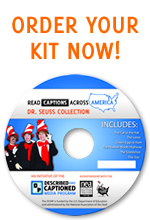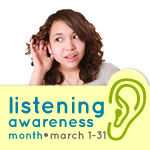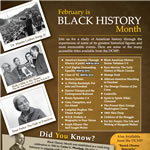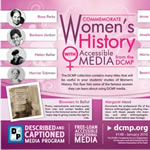

 |
 |
 |
 |
 |
 |
In this issue: |
Listening Awareness | Black History | Women’s History |
skip to quick hits
March is Listening Awareness MonthBack to article listing
The core concept of our Listening is Learning (LIL) campaign is that video with description is a great learning tool every day, all year long. March is “Listening Awareness Month” and a perfect time to promote description and teach people about its benefits. (See What is Description? for a definition and examples of description.) We’ve partnered with the International Listening Association (ILA) to strengthen our message. Of the partnership, ILA’s Laura Janusik said: “We are thrilled to be partnering with the Described and Captioned Media Program. Through our joint efforts, we can raise awareness about the educational, professional, and personal benefits of listening effectively.” Throughout the month of March, we encourage teachers, parents, and others to reinforce the benefits of listening to described media with their students, both those who are blind or visually impaired and those who are not. We invite you to order some of our colorful LIL posters and brochures to distribute to friends and colleagues to raise awareness about the benefits of listening to description. Perhaps the best way to learn about the benefits of listening to description is to actually experience some description. LIL is all about video-based media, and the DCMP provides a great deal of described educational content to its members. You can also check out the DCMP YouTube channel for some previews and exclusive videos with open description. There’s also a list of DVDs available with description on the Audio Description Project website along with a complete listing of current major motion pictures available with description (they call it DVS) on the MoPix website. Young Described Film Critic Contest
The second annual Young Described Film Critic Contest (YDFC), presented by the American Council of the Blind’s (ACB) Audio Description Project, is under way, and this year we’re hoping that even more students get involved in reviewing described films and media! Young people with a visual impairment have a chance to win prizes for themselves, recognition for their schools—and a chance to hold the awesome title “Young Described Film Critic of the Year”! All you need to do for a chance to win is to write, type, or record (audio or video) your own film review of any described movie and send it to us for review. More information is available from the YDFC page on the LIL site. Celebrate Black History Month With Accessible MediaBack to article listing
Every February, America observes Black History Month, a celebration of the varied contributions of African Americans to American history, culture, and prosperity through the years. Celebrated scholar Carter G. Woodson was among the first to recognize that important and revolutionary historical events and accomplishments were being withheld from American history books simply because those people who were involved were black. Starting in the 1920s, and throughout much of his life, Woodson championed the cause of recognizing these individuals—that African-American History is American history—eventually resulting in the formation of Black History Month. The DCMP recently asked leaders from two consumer organizations to share their thoughts about Black History Month and the importance of the historical events and figures at its core. As a result, two new articles have been added to the DCMP Clearinghouse, both of which are briefly excerpted below.
Blindness and Black History: One Leader’s Perspective
Sharing and understanding also help dispel myths and stereotypes that have all too often plagued this community. This is where I find a strong parallel between my experiences as a blind African American and the experiences of my sighted African-American peers.
Deafness and Black History: One Leader’s Perspective
As with the African-American community at large, Deaf African-Americans have prominent members of their own community who have made significant contributions to society at large. Here are several new titles focusing on black history, available with captions and description from the DCMP:
A more complete listing of available black history resources is available on our newly redesigned Black History Month flyer [PDF]. In addition to the media in our collection, the following black history–themed articles are available for download from the DCMP’s Clearinghouse of accessibility information:
Looking Ahead: Women’s History MonthBack to article listing
Less than forty years ago, women’s history was rarely incorporated into the K–12 curriculum. While women have worked tirelessly to shape, change, and mold history, they were often left out of the history books. The Women’s Movement of the sixties changed this as women began questioning their invisibility, developing high aspirations, and achieving dramatic new social and career opportunities. To celebrate influential women throughout history and their important achievements, March was declared Women’s History Month by Congress in 1987. Celebrate this time with your children and students by checking out a few women’s history titles from the DCMP collection:
A more complete listing of available women’s history resources is available on our newly redesigned Women’s History flyer [PDF]. In addition to the media in our collection, the following women’s history–themed articles are available for download from the DCMP’s Clearinghouse:
|
Subscribe to the NewsletterSubscribe to the DCMP newsletter.
RCAA: One Month Away!One short month from now, thousands of K–12 students across the U.S. will celebrate the literacy-boosting benefits of captioned media during the fifth-annual Read Captions Across America day! We hope that thousands more take part, and remind you that we’ve made event planning a bit easier this year by offering a free RCAA Event Kit to teachers, librarians, and parents who are interested in joining in. 


Spotlight on Emerging Technologies MediaAnother month, another batch of new titles from the DCMP’s Emerging Technologies partnership with CaptionMax. Download this month’s Emerging Technologies flyer for some suggestions, or visit the link in the footer to access a complete listing of titles. 


Presidents’ Day: February 15Don’t forget that Presidents’ Day is coming up in a couple weeks. The DCMP has a wide array of Presidency-themed media in its collection; for some suggestions, download our American Presidency flyer. [PDF] 


New Captioning Advocacy Initiative LaunchedThere is a new space to share timely information and action (advocacy) focused on captioning needs and resources. This new “work in progress” is called, provisionally, the CCAC, the “Collaborative for Communication Access via Captioning” (join the CCAC) for people with hearing loss who require captioning, most of whom need CART and good quality speech-to-text systems. Participation from concerned and energetic individuals and groups is invited now—from people with hearing loss, professional providers, attorneys, and interested others. 
|
 |
|
|
The Described and Captioned Media Program is funded by the U.S. Department of Education and administered by the National Association of the Deaf. |
DCMP Website Links |
The contents of this newsletter were developed under a grant from the U.S. Department of Education, Cooperative Agreement #H327N060002. However, those contents do not necessarily represent the policy of the U.S. Department of Education, and you should not assume endorsement by the Federal Government. Project Officer, Ernest Hairston.








